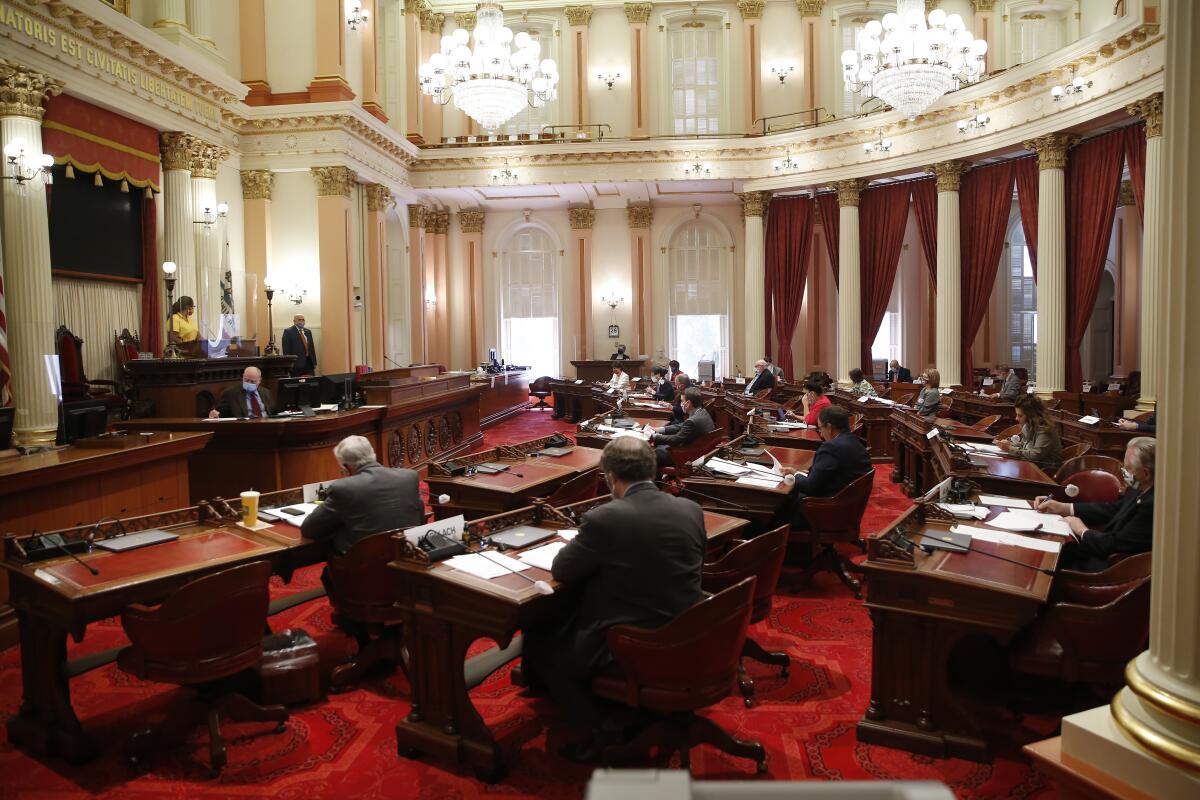California Legislature to consider new tax on millionaires for schools, other services

- Share via
SACRAMENTO — Democrats in the California Legislature have unveiled a new effort to significantly raise tax rates on taxable income of $1 million and higher, an effort they say would provide billions of dollars to improve K-12 schools and a variety of government services vital to the state’s recovery from the COVID-19 pandemic.
The bill, jointly introduced by 15 Democrats Monday in the Senate, is the clearest sign so far that liberal legislators and interest groups intend to put pressure on business-aligned lawmakers and Gov. Gavin Newsom for new tax revenue before the legislative session ends Aug. 31 — arguing that California’s deep-seated racial and socioeconomic inequities, exacerbated by the current recession, can’t be addressed without more government resources.
“When you take a look at the state, there’s a lot of pain and suffering out there, and we need to put every idea on the table,” said Assemblyman Miguel Santiago (D-Los Angeles), the bill’s author.
Assembly Bill 1253 lays out three new surcharges on income tax for California’s highest earners. It would impose a new 1% surcharge on adjusted gross income starting at $1 million, increasing to 3% for those who earn more than $2 million and rising to 3.5% for taxpayers with income above $5 million.
Santiago’s staff cites a labor-union analysis that the tax increase could amount to $6.8 billion in new annual revenue. That’s equal to almost half the amount of general-fund spending in the current fiscal year for the University of California and California State University systems.
If approved by a supermajority vote of both houses before the end of August and signed by Newsom, AB 1253 would apply to all income earned since Jan. 1. The impact would be felt almost immediately by taxpayers who file quarterly and face their next installment on Sept. 15.
Jeff Freitas, president of the California Federation of Teachers, praised the proposal as fair in light of continued success in the stock market for some of the state’s wealthiest residents during the coronavirus crisis, and record-high unemployment for millions of others.
“California must invest in essential services, including public education, in order to stop the spread of this pandemic and recover from this economic crisis,” he said. “The stark and widening inequality laid bare by the pandemic makes apparent that we must have a more equitable tax structure to invest in California.”
Education groups are likely to be some of the proposal’s biggest champions. The state budget signed last month by Newsom relies on $12.5 billion in deferred payments to public schools, money the schools will have to borrow or take from their reserves and wait to be repaid in years to come.
Even with overwhelming Democratic majorities in both the state Senate and Assembly, a new and permanent increase in income tax is far from a sure bet. Sizable numbers of Democrats in both houses are generally more aligned with the limited tax positions of business groups. Critics are already warning the bill could be an economic drag on the state.
“During the worst recession in decades, it would be an astonishingly bad idea to enact a massive tax increase,” said David Kline, a spokesman for the California Taxpayers Assn.
Other than a controversial recession-inspired levy imposed in 1991 with the backing of the governor at the time, Pete Wilson, state lawmakers have shied away from tax increases. The last effort was in 2009, when legislators and Gov. Arnold Schwarzenegger asked voters to extend temporary taxes — a ballot measure that was soundly defeated and resulted in the electoral defeat of Republican lawmakers who joined Democrats in supporting the proposal.
Voters changed their minds in 2012, imposing temporary income and sales taxes championed by Gov. Jerry Brown and labor unions. The income tax increases, affecting those earning more than $250,000, were extended by voters in 2016 and will expire in 2030.
The tax increases in AB 1253 would be permanent. Santiago, who said he has spent most of his recent weekends watching long lines at food banks in his district, stretching through much of downtown L.A., said he worries that low-income communities will continue to suffer long after the coronavirus is contained.
“We’re not talking about increasing taxes on the average person,” Santiago said. “This is an idea that should be debated.”
AB 1253 would affect the tax returns of only 0.5% of those who filed in 2018, according to data compiled by the state Franchise Tax Board. But those taxpayers already account for 40% of all income tax revenue collected that year — a function of the state’s strongly progressive tax structure.
California’s highest marginal tax rate is 13.3%, higher than that of any other state, according to statistics compiled by the Tax Foundation, a conservative-leaning think tank in Washington, D.C. For years, critics of California’s tax policy have warned that its most wealthy residents might consider moving to other states if taxes continue to rise.
In the meantime, demand for government services is on the rise. The state’s Employment Development Department has paid out jobless benefits to 8.7 million Californians since the beginning of March. And while the state’s budget was balanced for the current year, with a combination of delayed payments and cash reserves, estimates are that additional actions will be needed next year to fill an operating deficit currently projected at $8.7 billion.
More to Read
Sign up for Essential California
The most important California stories and recommendations in your inbox every morning.
You may occasionally receive promotional content from the Los Angeles Times.











